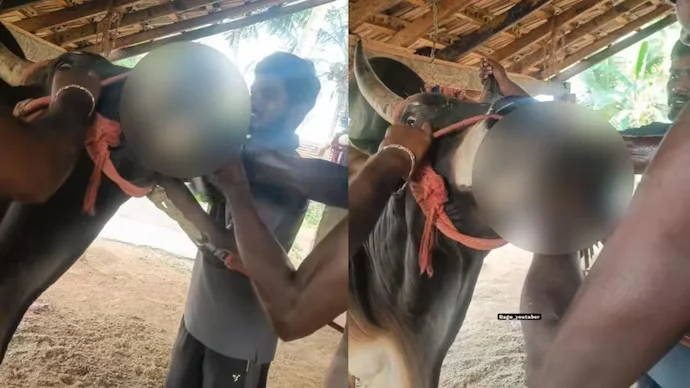
Introduction:
In a shocking incident that has sparked public outrage, a Jallikattu bull was allegedly forced to chew on a live rooster, leading to swift legal action against a popular YouTuber. Jallikattu, a traditional bull-taming sport in Tamil Nadu, India, has long been a subject of controversy due to concerns about animal welfare. This recent incident, however, has taken the debate to a new level, prompting calls for stricter regulations and ethical treatment of animals.
The Incident:
The controversial video, uploaded on the YouTuber‘s channel, depicted the Jallikattu bull being coerced into chewing on a live rooster as part of what was claimed to be a “challenging and unique” stunt. The footage quickly went viral, drawing condemnation from animal rights activists, social media users, and the general public. Critics argue that such acts not only promote cruelty towards animals but also violate the ethical principles surrounding traditional practices like Jallikattu.
Legal Consequences:
In response to the public outcry, a case has been filed against the YouTuber responsible for the video. Animal welfare organizations and activists have been actively involved in pursuing legal action, highlighting the need for accountability and deterrent measures to prevent such incidents in the future. Legal experts suggest that the YouTuber could face charges related to animal cruelty, a serious offense under Indian law.
Public Outcry and Debate:
The incident has reignited the ongoing debate surrounding the ethical treatment of animals in traditional sports and cultural practices. Supporters of Jallikattu argue that the sport holds cultural significance and is deeply rooted in tradition, while opponents emphasize the need for reforms to ensure the humane treatment of animals involved. The incident has prompted discussions about striking a balance between preserving cultural heritage and protecting animal rights.
Regulatory Reforms:
The controversy has also brought attention to the necessity of stronger regulations and oversight regarding animal welfare in traditional sports. Calls for stricter guidelines, monitoring mechanisms, and penalties for those who engage in cruelty towards animals during such events have gained momentum. The incident has become a catalyst for advocates of animal rights to push for comprehensive reforms in the way traditional practices are conducted.
Conclusion:
The Jallikattu incident involving a bull being made to chew on a live rooster has not only shocked the public but has also ignited a broader conversation about the ethical treatment of animals in traditional sports. As legal proceedings unfold, the case serves as a stark reminder of the need for balancing cultural preservation with a commitment to preventing cruelty towards animals. It remains to be seen how this incident will impact the ongoing discussions surrounding the regulation and ethical considerations of traditional practices like Jallikattu.




